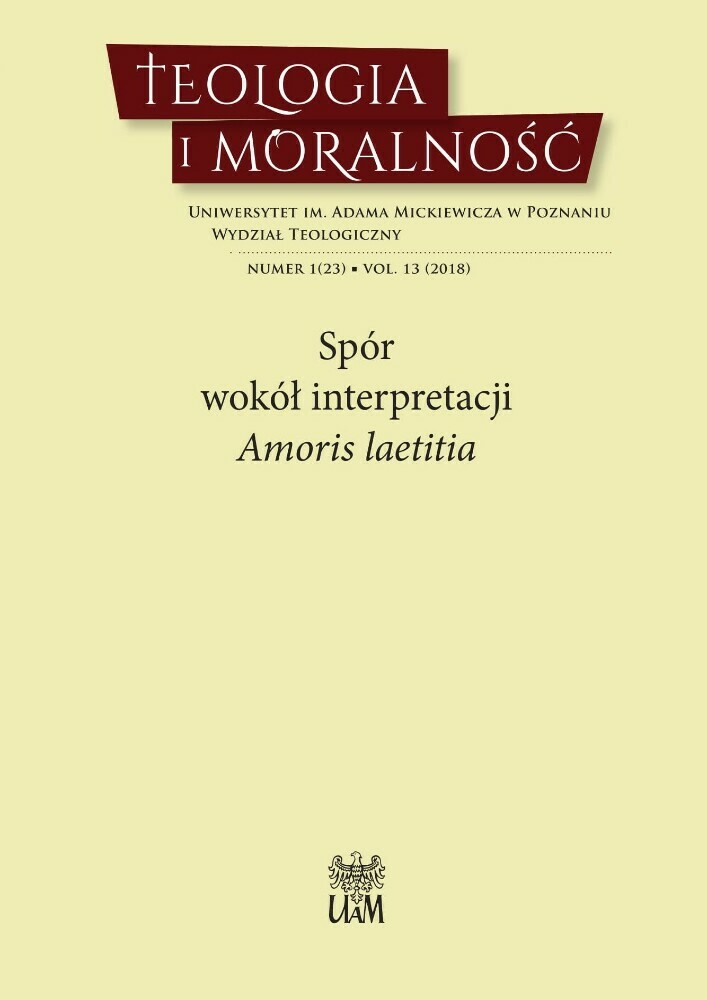Abstract
In his apostolic letter Pope Francis underlines indeed the connection with the statements of his predecessors, but he performs also an important paradigm shift in the tradition of the Church concerning the marriage and the family. This step allows the new approach to remarried people after the breakdown of their sacramental marriage. This paradigm shift concerns not only such situations but the marital and familial ethics as a whole. The pope encourages to respect towards the judgment of the spouses conscience and expresses his extensive skepticism towards the deductive methods in the moral considerations. In the previous Church teaching with the help of these methods, conclusions concerning every single situation were derived from general truths. According to the Pope Francis the logics of marginalization and exclusion can no longer be the way of the Church. As the Pope says, the Church cannot throw the moral laws like stones at the people who do not follow the ideals. They should be rather invited to make next steps on the way of love, which they recognize in their conscience as an answer to the God’s call, here and now.References
Brantl J. (2016), Zwischen Einzelfallprüfung und gültiger Norm, Wywiad dla katholisch.de z 5.12.2016, http://www.katholisch.de/aktuelles/aktuelle-artikel/zwischen-einzelfallprufung-und-gultiger-norm [dostęp: 4.03.2018].
Gruber H.G. (1994), Christliche Ehe in moderner Gesellschaft. Entwicklung – Chancen – Perspektiven, Freiburg i. Br..
Häring B. (1963), Das Gesetz Christi. Moraltheologie dargestellt für Priester und Laien, t. 1, Freiburg.
Jüngel E. (1977), Gott als Geheimnis der Welt, Tübingen.
Jan Paweł II (1981), Adhortacja apostolska Familiaris consortio, http://w2.vatican.va/content/john-paul-ii/it/apost_exhortations/documents/hf_jp-ii_exh_19811122_familiaris-consortio.html [dostęp: 03.03.2018].
Orth. S. (2016), Vatikan: Franziskus gibt Lesehilfe für Amoris Laetitia, „Herder Korrespondenzˮ 70, s. 48.
Pieper J. (1996), Über die Liebe, w: J. Pieper, Werke, red. B. Wahl, t. 4: Schriften zur Philosophischen Anthropologie und Ethik: Das Menschenbild der Tugendlehre, Hamburg.
Pinckaers S., Les sources de la morale chrétienne. Sa méthode, son contenu, son histoire, Freiburg i. Üe. 1985.
Pius XI (1930), Encyklika Casti connubii, http://w2.vatican.va/content/pius-xi/it/encyclicals/documents/hf_p-xi_enc_19301231_casti-connubii.html [dostęp: 03.03.2018].
Rhonheimer M. (1994), Praktische Vernunft und Vernünftigkeit der Praxis. Handlungstheorie bei Thomas von Aquin in ihrer Entstehung aus dem Problemkontext der aristotelischen Ethik, Berlin.
Thomae de Aquino (1996), Sancti Thomae de Aquino Opera omnia iussu Leonis XIII P.M. edita, t. 25, 2: Quaestiones de quolibet… Quolibet I, II, III, VI, IV, V, XII. Indices, Roma–Paris.
Thomae de Aquino (1892), Sancti Thomae Aquinatis Doctoris Angelici Opera omnia iussu impensaque Leonis XIII P.M. edita, t. 7: Prima Secundae Summae theologiae a questione LXXI ad questionem CXIV, Romae.
Schröer Ch. (1995), Praktische Vernunft bei Thomas von Aquin, Stuttgart m.in.
Stanke G. (1984), Die Lehre von den „Quellen der Moralität“. Darstellung und Diskussion der neuscholastischen Aussagen und neuerer Ansätze, Regensburg.
License

This work is licensed under a Creative Commons Attribution-NoDerivatives 4.0 International License.
